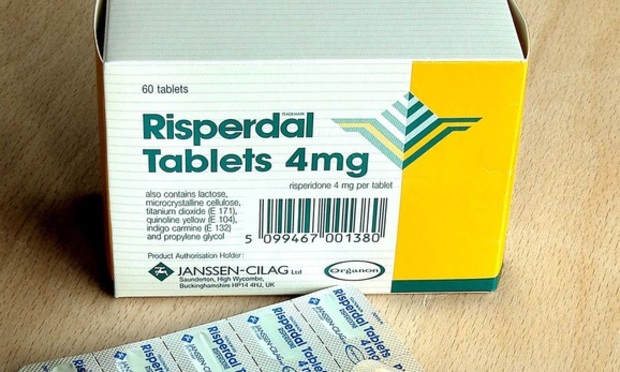Superior Court Affirms $70M Risperdal Verdict, Remands for Possible Punitives
The Pennsylvania Superior Court has ruled that a $70 million jury verdict against Johnson & Johnson subsidiary Janssen and in favor of a child allegedly injured by antipsychotic drug Risperdal was not excessive, and has also remanded the case for a second look at whether there should be a punitive damages trial.
November 26, 2019 at 04:21 PM
4 minute read
 Photo: Wikimedia Commons
Photo: Wikimedia Commons
The Pennsylvania Superior Court has ruled that a $70 million jury verdict against Johnson & Johnson subsidiary Janssen and in favor of a child allegedly injured by antipsychotic drug Risperdal was not excessive, and has also remanded the case for a second look at whether there should be a punitive damages trial.
A three-judge panel of the appellate court unanimously ruled in A.Y. v. Janssen Pharmaceuticals to uphold Philadelphia Court of Common Pleas Judge Paula Patrick's judgment entered after the jury sided with A.Y., a male plaintiff who claimed that the anti-psychotic medication caused him to grow excessive breast tissue.
"We discern no reversible error with the jury's award of damages, as we do not view it as inconsistent with the evidence," Judge Correale Stevens wrote for the panel in a Nov. 26 opinion. "A.Y. was just 4 1/2 years old when first prescribed Risperdal, and he has never since known life without gynecomastia. At 16 years of age when the jury considered its award, A.Y. was living with severe and permanent disfigurement. The undisputed record confirms he has been routinely bullied and teased by peers and is too humiliated to ever remove his shirt in recreational or social situations where it would be customary for boys to do so when enjoying ordinary pleasures of youth."
But the panel, which also included Judges Deborah Kunselman and Jack Panella, reversed the portion of Patrick's ruling that said New Jersey law applied to the case and therefore foreclosed the possibility of punitive damages. The panel pointed to recent rulings in Stange v. Janssen and Murray v. Janssen Pharmaceuticals, which held, respectively, that New Jersey law does not apply to the Risperdal litigation globally and that each case needed to be assessed individually to determine whether New Jersey law or the law of the plaintiff's home state applied.
"Here, appellees present the same arguments made by the plaintiffs in the aforementioned cases, and both parties agree the decisions by our court remain binding precedent," Stevens said, remanding A.Y. for a conflict-of-law analysis between New Jersey law and that of the plaintiff's home state of Tennessee.
Patrick had issued a lengthy opinion in June 2018, saying the compensatory damages award was within the jury's discretion.
"This court did not invalidate the jury's verdict because the award was not unreasonable," Patrick said. "Assessing damages in a case such as this is a difficult task. … Upon consideration of the evidence presented at trial and the damages sustained by plaintiffs, this court believes that the jury's finding should not be disturbed."
Stevens agreed.
"The jurors were free to call upon their personal experiences and sensibilities to assess such intangible harms, and their valuation could reflect the length of time A.Y. would reasonably be expected to live with this disfiguring, embarrassing condition," Stevens said. "Under such facts, the jury exercised sound discretion."
The appeals court also rejected the defense's argument that federal law preempted the plaintiff's claim that Tennessee law required Janssen to change labeling to reflect juvenile Risperdal users' heightened risk of gynecomastia.
Janssen argued that it would have been impossible for it to comply with both Tennessee law and federal law, which requires the U.S. Food and Drug Administration to approve drugmakers' label changes. But Stevens said Janssen failed to show that the FDA would have rejected a change to the label that strengthened the warning of potentially adverse effects.
Counsel for A.Y., Charles "Chip" Becker and Tom Kline of Kline & Specter in Philadelphia, along with Jason Itkin of Arnold & Itkin in Houston, said in a statement, "This jury verdict affirmance and rejection of Johnson & Johnson's preemption arguments dovetails with the appellate rulings against Johnson & Johnson relating to the drug Risperdal, where similar verdicts have been upheld, punitive damages have been reinstated, and cases dismissed under the statute of limitations have been reinstated, all paving the way for continued progress and additional jury verdicts against a company whose misconduct toward children has been exposed in the courts of this commonwealth; we look forward to the punitive damages trial in this case."
Janssen was represented by Kenneth Murphy of Drinker Biddle & Reath in Philadelphia. A spokesperson for Johnson & Johnson did not respond to a request for comment.
This content has been archived. It is available through our partners, LexisNexis® and Bloomberg Law.
To view this content, please continue to their sites.
Not a Lexis Subscriber?
Subscribe Now
Not a Bloomberg Law Subscriber?
Subscribe Now
NOT FOR REPRINT
© 2025 ALM Global, LLC, All Rights Reserved. Request academic re-use from www.copyright.com. All other uses, submit a request to [email protected]. For more information visit Asset & Logo Licensing.
You Might Like
View All
Ozempic Defendants Seek to Shave 'Tacked On' Claims From MDL Complaint
3 minute read
Plaintiff Argues Jury's $22M Punitive Damages Finding Undermines J&J's Talc Trial Win
4 minute read
'Discordant Dots': Why Phila. Zantac Judge Rejected Bid for His Recusal
3 minute read
Pittsburgh Jury Tries to Award $22M Against J&J in Talc Case Despite Handing Up Defense Verdict
4 minute readLaw Firms Mentioned
Trending Stories
Who Got The Work
J. Brugh Lower of Gibbons has entered an appearance for industrial equipment supplier Devco Corporation in a pending trademark infringement lawsuit. The suit, accusing the defendant of selling knock-off Graco products, was filed Dec. 18 in New Jersey District Court by Rivkin Radler on behalf of Graco Inc. and Graco Minnesota. The case, assigned to U.S. District Judge Zahid N. Quraishi, is 3:24-cv-11294, Graco Inc. et al v. Devco Corporation.
Who Got The Work
Rebecca Maller-Stein and Kent A. Yalowitz of Arnold & Porter Kaye Scholer have entered their appearances for Hanaco Venture Capital and its executives, Lior Prosor and David Frankel, in a pending securities lawsuit. The action, filed on Dec. 24 in New York Southern District Court by Zell, Aron & Co. on behalf of Goldeneye Advisors, accuses the defendants of negligently and fraudulently managing the plaintiff's $1 million investment. The case, assigned to U.S. District Judge Vernon S. Broderick, is 1:24-cv-09918, Goldeneye Advisors, LLC v. Hanaco Venture Capital, Ltd. et al.
Who Got The Work
Attorneys from A&O Shearman has stepped in as defense counsel for Toronto-Dominion Bank and other defendants in a pending securities class action. The suit, filed Dec. 11 in New York Southern District Court by Bleichmar Fonti & Auld, accuses the defendants of concealing the bank's 'pervasive' deficiencies in regards to its compliance with the Bank Secrecy Act and the quality of its anti-money laundering controls. The case, assigned to U.S. District Judge Arun Subramanian, is 1:24-cv-09445, Gonzalez v. The Toronto-Dominion Bank et al.
Who Got The Work
Crown Castle International, a Pennsylvania company providing shared communications infrastructure, has turned to Luke D. Wolf of Gordon Rees Scully Mansukhani to fend off a pending breach-of-contract lawsuit. The court action, filed Nov. 25 in Michigan Eastern District Court by Hooper Hathaway PC on behalf of The Town Residences LLC, accuses Crown Castle of failing to transfer approximately $30,000 in utility payments from T-Mobile in breach of a roof-top lease and assignment agreement. The case, assigned to U.S. District Judge Susan K. Declercq, is 2:24-cv-13131, The Town Residences LLC v. T-Mobile US, Inc. et al.
Who Got The Work
Wilfred P. Coronato and Daniel M. Schwartz of McCarter & English have stepped in as defense counsel to Electrolux Home Products Inc. in a pending product liability lawsuit. The court action, filed Nov. 26 in New York Eastern District Court by Poulos Lopiccolo PC and Nagel Rice LLP on behalf of David Stern, alleges that the defendant's refrigerators’ drawers and shelving repeatedly break and fall apart within months after purchase. The case, assigned to U.S. District Judge Joan M. Azrack, is 2:24-cv-08204, Stern v. Electrolux Home Products, Inc.
Featured Firms
Law Offices of Gary Martin Hays & Associates, P.C.
(470) 294-1674
Law Offices of Mark E. Salomone
(857) 444-6468
Smith & Hassler
(713) 739-1250





